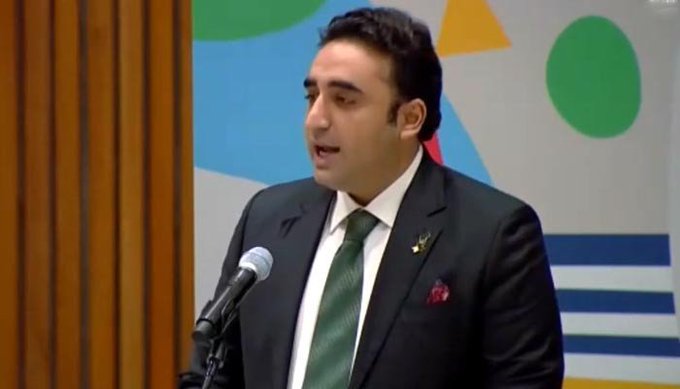FM urges UN chief for mediatory measures seeking reversal of Indian unilateral actions in IIOJK

New York: Foreign Minister Bilawal Bhutto Zardari on Wednesday urged the United Nations Secretary-General Antonio Guterres to avail the full panoply of mediatory measures to persuade India to reverse its unilateral measures in the Indian Illegally Occupied Jammu and Kashmir.
The foreign minister, in his address at the 12th Ministerial Meeting of the UN Group of Friends of Mediation on “Avoiding Humanitarian Crises Through Mediation” also sought UN chief’s mediatory role to seek India’s agreement to promote an equitable solution to the Jammu and Kashmir dispute in accordance with UN Security Council resolutions and the UN Charter.
The Security Council should give full support to the secretary-general in using his good offices to this end, he told the meeting held on the sidelines of the 77th session of the UN General Assembly here.
He thanked the Co-Chairs Turkiye and Finland for organizing the meeting and said that Pakistan also commended the UN Secretary-General and Turkish President Erdogan for successfully mediating the landmark Black Sea Grain Initiative.
He said the important role of the United Nations in conflict prevention was unquestionable and at any stage of a conflict, the Security Council could recommend to the parties appropriate procedures or methods of settlement of their dispute, which may include mediation.
Bilawal Bhutto said that the UNSC also has the power to recommend terms of settlement to the parties, if they request this or if the Council considers that the continuance of their dispute was in fact likely to endanger the maintenance of international peace and security.
FM urges UN chief for mediatory measures seeking reversal of Indian unilateral actions in IIOJK
However, he said nearly 77 years after the signing of the Charter, the challenges and threats to peace and security were perhaps more complex, but the Charter’s purposes and principles remained valid and immutable.
“It is imperative to reaffirm our commitment and confidence in these principles and to promote solutions to disputes and conflicts, between large and small States, on the basis of these principles,” the foreign minister remarked.
He said the secretary-general’s repeated calls for a ‘surge in diplomacy’ for peace was both urgent and important. And, such a surge of diplomacy must emanate from the United Nations and the machinery that was available to it for the purpose, including for mediation and similar means of dispute resolution.
He told the gathering that Jammu and Kashmir dispute was one of the oldest issues on the agenda of the Council.
At the outset, the Security Council decided that “the final disposition of the State of Jammu and Kashmir would be made in accordance with the will of the people expressed through the democratic method of a free and impartial plebiscite conducted under the auspices of the United Nations”.
He said the UNSC also instituted several mechanisms to secure the implementation of its decisions on Jammu and Kashmir, including the UN Commission on India and Pakistan (UNCIP); the deployment of the UN Military Observer Group in India and
Pakistan (UNMOGIP); and the appointment of several distinguished Special Representatives.
“Unfortunately, over the last 7 decades, India obstructed the efforts of the UN mechanisms to implement the UNSC resolutions on Jammu and Kashmir. The continuation of India’s illegal actions was manifested in the unilateral measures taken on and since 5 August 2019 to annex the occupied territory of Jammu and Kashmir without even the fig leaf of legal justification or plebiscite,,” the foreign minister added.
He said Pakistan continued to advocate a more active role by the United Nations Security Council and the secretary-general.





